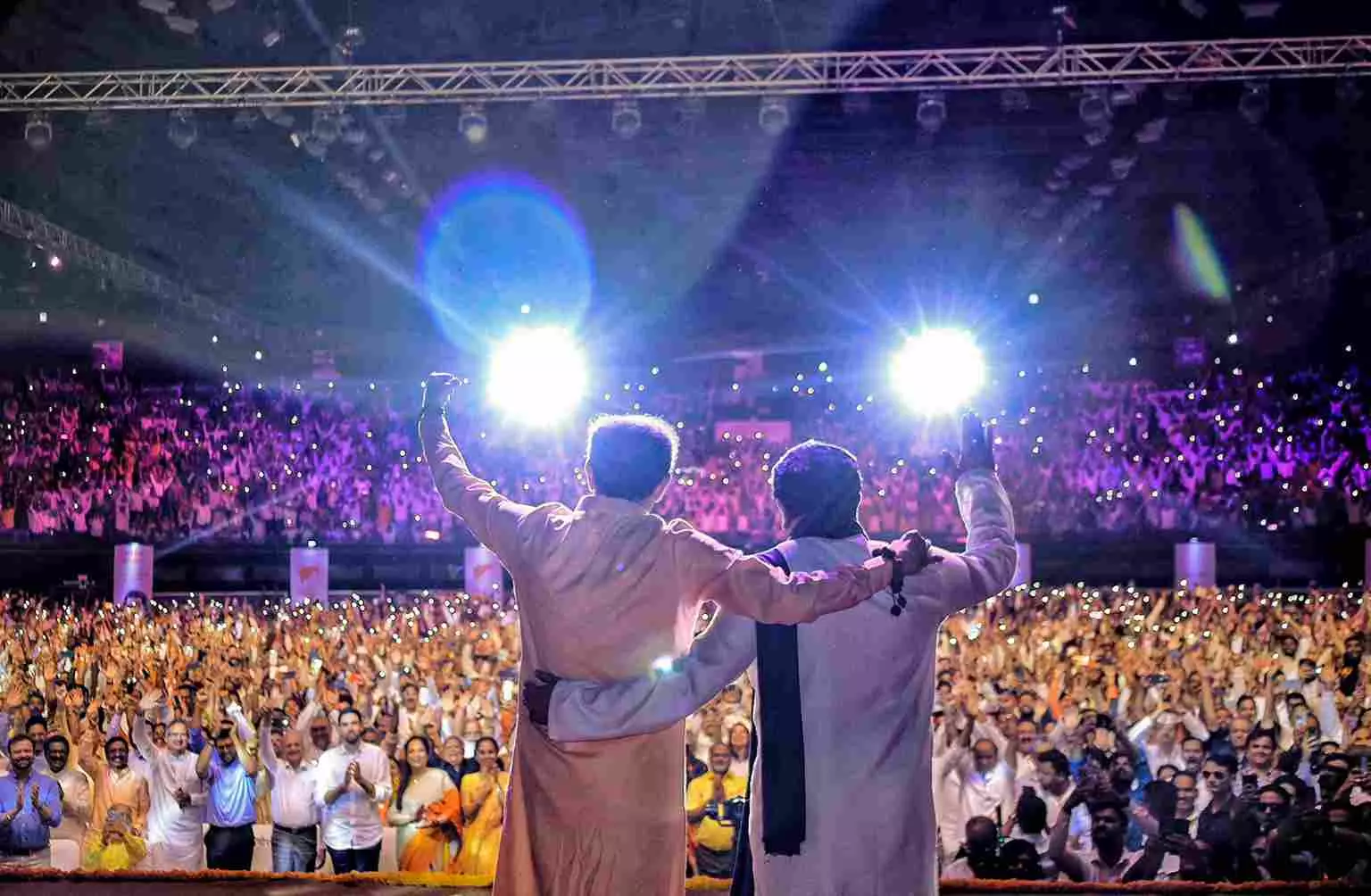
Uddhav-Raj Thackeray chemistry aside, can it break the Mahayuti maths?
While joining forces for a cause like ‘Marathi pride’ may resonate with the public, political analysts caution that forming a lasting political alliance is a far more complex challenge

While the high-profile reunion of Shiv Sena (UBT) chief Uddhav Thackeray and MNS leader Raj Thackeray holds the potential to reshape Maharashtra’s political landscape, mere unity speeches won’t be enough to build a formidable alliance capable of taking on the ruling Mahayuti coalition, which currently enjoys a commanding majority in the state.
Political analysts believe the reunion of the Thackeray cousins stems from the existential crisis facing their respective parties, Shiv Sena (UBT) and MNS, which is evident from their dismal performance in last year’s Maharashtra Assembly elections.
Also read | ‘Maha’ reunion in Mumbai: Top 10 things Uddhav, Raj Thackeray said in their rally
In the 2024 state elections, the Eknath Shinde-led Shiv Sena secured 57 seats with a 12.5 per cent vote share, while Uddhav Thackeray’s faction managed just 20 seats with a 10 per cent vote share. In the 50 direct contests between the two, Shinde’s Sena won 36, leaving only 14 for Uddhav’s camp. Notably, Raj Thackeray’s MNS failed to win a single seat, garnering a mere 1.6% of the vote.
Challenging road ahead
Talking to The Federal, political analyst Abhay Deshpande described the reunion of the Thackeray cousins as a significant political development in Mumbai. However, he questioned whether the momentum would last and whether their coming together would truly lead to a consolidation of Marathi voters. While joining forces for a cause like ‘Marathi pride’ may resonate with the public, he cautioned that forming a lasting political alliance is a far more complex challenge.
Deshpande pointed out that Raj and Uddhav Thackeray had originally split over the question of Sena founder Bal Thackeray's political successor, an issue that, he noted, still lingers. “We’ll have to wait another six months to understand what this reunion means for Maharashtra’s political landscape,” he said.
Referring to Raj Thackeray’s body language during the July 5 rally in Mumbai, Deshpande said it suggested discomfort with Uddhav, underscoring the emotional and political distance between them. He contended that both the Shiv Sena (UBT) and MNS are currently facing existential challenges, which may have driven them to unite.
Deshpande highlighted several hurdles the two leaders must overcome. “First, they need to set aside personal differences and egos before tackling practical challenges like seat-sharing for the BMC elections,” he said. He ruled out the possibility of a merger between the two parties, asserting that both cousins are likely to maintain their political identities. “It’s far too early to discuss a merger,” he concluded.
Need for fresh narrative
Nagpur-based senior journalist Alok Tiwari believes that while the reunion of the Thackeray cousins may have political repercussions, it will take more than their coming together to ensure long-term success. Speaking to The Federal, he pointed out that the core issue that united them, Marathi pride, has largely lost momentum after the government withdrew its directive to introduce Hindi from Class 1. Moreover, Uddhav’s consistent portrayal of Deputy CM Eknath Shinde as a “traitor” appears to have lost traction among people.
Also read | Why did Congress skip Thackeray cousins’ reunion?
Tiwari also noted that the public has not responded positively to the MNS’ aggressive tactics in the name of Marathi pride, nor to its attempts to revive the militant style of Bal Thackeray’s era. “In this scenario, the two cousins will have to come out with a fresh narrative to win over the voters in the long term,” he added.
He suggested that Uddhav’s outreach to Raj Thackeray is driven primarily by the upcoming Brihanmumbai Municipal Corporation (BMC) elections, given that the cash-rich civic body remains Shiv Sena (UBT)’s last stronghold. However, Tiwari expressed scepticism over whether the alliance will yield electoral gains. “While the Thackeray cousins’ reunion might strike an emotional chord with voters, I’m unsure it will convert into votes, particularly since the MNS isn’t a major political force,” he said.
Alarm bells for Shinde?
Meanwhile, their reunion may pose some serious threat to Deputy Chief Minister Eknath Shinde as it undermines his claim to Bal Thackeray’s legacy and poses a challenge to his support base among core Marathi voters.
With Uddhav and Raj putting up a united front, Shinde is expected to struggle in shedding the labels of “outsider” and “gaddar” (traitor). He now faces a significant challenge on his turf, the urban strongholds of Maharashtra, particularly the Mumbai Metropolitan Region (MMR), where a consolidated Marathi regionalist platform led by the Thackeray cousins could prove difficult for him to counter.
The growing buzz around the 'Thackeray alliance' just ahead of the civic body elections, particularly the high-stakes Brihanmumbai Municipal Corporation (BMC) polls, appears to be causing concern for Shinde, as a weak performance could significantly undermine his political clout. Better known for his behind-the-scenes political maneuvering than for public charisma, Shinde may find it difficult to maintain his footing, as his cadre, lower-level leaders, and grassroots workers could begin gravitating toward the emerging resurgent front led by the Thackerays.
Also read | Uddhav, Raj Thackeray reunite to hold joint protest against Hindi 'imposition' in schools
Shinde’s biggest worry will be the potential weakening of his influence within the ruling alliance. The Uddhav-Raj alliance also risks further straining his already fragile ties with the BJP. Just a day before the Thackerays’ rally, the Deputy CM’s “Jai Gujarat” slogan, delivered in the presence of Union Home Minister Amit Shah in Pune, was widely seen as a sign of his unease over the emerging political front.

